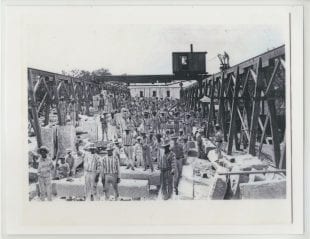Books, photographs and even old newspapers can survive for decades without any help. You don’t need any special technology to access or see them, only your hands and eyes. Digital items, on the other hand, are easily deleted, corrupted or simply lost. And as technology rapidly changes, old formats become obsolete; try finding a Betamax to play old video cassettes buried in the back of a closet.

“Prisoners on a construction site, Convict Leasing Photograph 13,” Woodson Research Center – Fondren Library – Rice University
“Things are being lost every day,” said Maya Reine, assistant director for Rice University’s Center for Engaged Research and Collaborative Learning (CERCL). “It’s important for communities to know the importance of archiving. They may not realize that items are significant, but they may mean something to a researcher.”
That’s one reason CERCL, in partnership with the Fondren Library, is searching for a postdoctoral fellow in data curation for African American Studies. The position is a result of a successful joint grant application to the Council on Library and Information Resources Postdoctoral Fellowship program, for which Rice will be a host institution. The fellow will lead efforts to curate digital collections focused on African American activism and cultural expression in Houston.
This fellowship presents a unique opportunity to hone expertise in community archiving and curating data, Reine said. It’s also a chance to help local organizations such as Black Lives Matter Houston, the Community Artists’ Collective and groups addressing the legacy of convict leasing manage their own digital collections. The fellow will also assist with ongoing work such as the present Sugar Land convict leasing archives at the Woodson Research Center.
“CERCL is obviously very concerned with community engagement,” Reine said. In addition to helping Houston organizations develop and digitize their own archives, she said the fellow will also hold workshops both on campus and in the community.
“Some of the things (these organizations find) would be archived here, but they’ll also be able to create their own archives,” Reine said. “They’ll know what items are archivable, why you keep certain things, who’s going to use them and in what ways.”
The fellow will be co-housed in Digital Scholarship Services and CERCL but will partner with the Woodson Research Center and other colleagues across campus. Between Rice’s new Center for African and African American Studies (CAAAS) and an abundance of AAAS programming and several curatorial and digital scholarship projects in African and African American Studies, it’s likely the fellow will find many partnership opportunities.
Harrison Guy, CERCL’s artist-in-residence, is planning a spring performance in the Moody Center for the Arts, which itself is hosting a semesterlong exhibition of contemporary African artists starting Jan. 24. And CAAAS has teamed up with the Department of Visual and Dramatic Arts to bring four African and African American artists to campus for a four-part lecture series throughout the spring semester.
“It’s a really exciting time,” Reine said.

